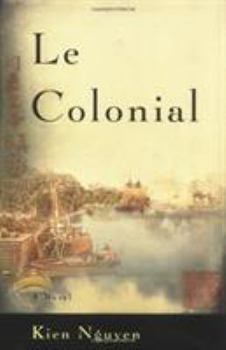Le Colonial
Select Format
Select Condition 
Book Overview
A "richly satisfying" epic of Asian history in the tradition of James Clavell (Newsday), from the bestselling author of The Tapestries.
Format:Hardcover
Language:English
ISBN:0316285013
ISBN13:9780316285018
Release Date:August 2004
Publisher:Little Brown and Company
Length:336 Pages
Weight:1.26 lbs.
Dimensions:1.2" x 6.3" x 9.3"
Related Subjects
Contemporary Fantasy Fiction Literary Literature & Fiction Science Fiction & FantasyCustomer Reviews
2 ratings
A Talented Writer Whose Words Are Worth Reading
Published by Thriftbooks.com User , 19 years ago
Francois Gervaise, a talented but starving young artist in 18th Century France, warms himself at the same outdoor fire as common peasants. A dark past haunts him as he longs to flee his country. Handsome Gervaise positions himself to do so with the help of staunch Jesuit Bishop Pierre de Behaine, a man recruiting missionaries to aid him in taking Christianity to the uncivilized shores of Annam, later called Vietnam. Gervaise befriends, poor yet hotheaded, teenager Henry Monange who signs on as the artist's assistant. After a long journey, the three Frenchmen find themselves in the midst of real-life Asian history, as a civil war erupts between northern and southern Annam. The two younger men are eventually sentenced to death by rebel peasants due to unpaid taxes. Gervaise steps forward to save the day and renounces Christianity for Buddhism. Behaine, who loathes Buddism and is committed to France's religious and political agenda, clashes with Gervaise. In the midst of all the tension, young Henry falls in love with a servant girl named Xuan who has been selected as French-supported Prince Anh's concubine. Conflicts abound from issues of love to issues of territory and brewing politics. Kien Nguyen's second novel allows the reader to consider the importance of similar conflict that takes place in the 1960s and 1970s in Vietnam. It takes an unflattering look at the way Christianity was introduced to places considered ignorant and uncivilized by early missionaries.
The changing tide of history
Published by Thriftbooks.com User , 20 years ago
While selecting missionaries to send to Annam, just below China along the edge of the China Sea, Monsignor Pierre de Behaine encounters a young artist, Francois Gervais, who begs to be allowed on the voyage. De Behaine is determined to teach the infidels of Cochin China about the true God, in a land where the Christian faith has yet to take root in 1773. Henri Jacques Monange is only fourteen when he makes his way to Marseilles, one step ahead of the law. Unable to find employment, Henri nearly falls into a life of crime when Francoise takes him under his wing, taking him as an assistant on the voyage across the sea, eventually rendezvousing with de Behaine in India. Thus the three men link their futures in a foreign country, only one of them with a real strategy to bring glory to their native France. Whatever their expectations, after more than 8 months at sea, none of those who have come in service of the missionaries of Monsignor de Behaine, including Henri and Francois, are prepared for what awaits them in this unfamiliar place. When civil war breaks out, all are caught up in a tidal wave of violence. After a series of harrowing events befall Francois and Henri, they are left in despair, wandering an indifferent city. For all they know, God has abandoned them in this vast, pagan land. Of course, the future is never predictable, and neither Henri nor Francois can predict their fate or when Monsignor de Behaine will come into their lives again. Warlords, kings, mandarins, peasants and natural disasters are all part of the strange world they have come to change; de Behaine has been there before, but the others have allowing their imaginations to construct a world that does not exist. In reality, they live in imminent danger of death or imprisonment. In Nguyen's beautifully rendered and violent novel, Pierre de Behaine would appear to be the spiritual guide, privy to the whispered instructions of God, certainly in pursuit of his own vision. But it is Francois Gervaise and Henri Monange who are the most complicated and humane characters. Francois follows an inner voice, but is beset by doubts. His choices greatly affect his survival, but, more importantly, his spiritual condition. A gifted artist, Francois is Godly man, with the spirit of true religious fervor, forged by experience. Henri is only sixteen when their most serious trials begin. Although he loves Francois, his teacher, he dearly misses his mother in France, whom he was forced to leave behind. Pulled in many directions by an innate sense of right and wrong, Henri is the most accessible and least ascetic of the three men. True to his youthful nature, undisciplined and given to anger, Henri also has the qualities that inspire trust in his judgment and sense of duty. Each of these men reacts differently to this constantly changing environment, where their fate can be altered momentarily by feast, famine or the whims of a king or warlord. Their adventures are extraordinary and exot






